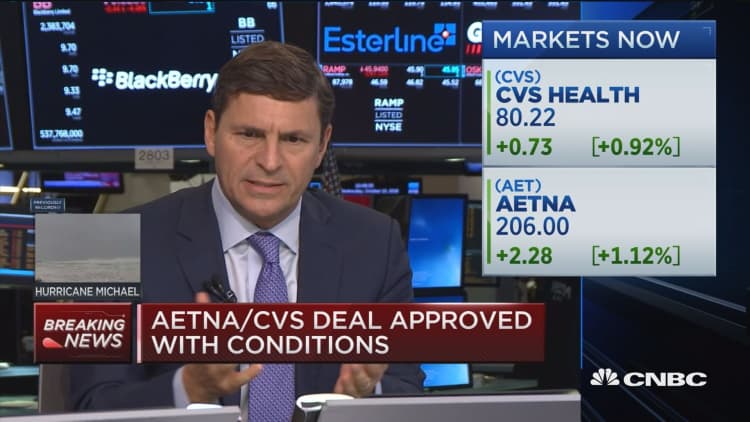
The Department of Justice gave preliminary approval Wednesday for CVS Health's acquisition of insurer Aetna, cementing a deal that could transform how U.S. consumers access health care.
The two companies cleared their path to merge when Aetna announced Sept. 27 that it reached an agreement to sell its Medicare Part D drug plan business to WellCare Health Plans for an undisclosed amount. Regulators were concerned about the overlap between CVS' and Aetna's Medicare Part D plans. The Justice Department said that the divestiture was a condition to winning final approval.
"The divestitures required here allow for the creation of an integrated pharmacy and health benefits company that has the potential to generate benefits by improving the quality and lowering the costs of the healthcare services that American consumers can obtain," Assistant Attorney General Makan Delrahim said in a statement.
CVS, the nation's largest drugstore chain, announced in December that it would buy Aetna for about $69 billion in cash and stock. The deal combines CVS' pharmacies with Aetna's insurance business, blurring traditionally distinct lines in hopes of lowering costs. CVS also has one of largest pharmacy benefits managers through CVS Caremark and a major Medicare Part D plan sponsor through its SilverScript unit.
CVS CEO Larry Merlo outlined his vision for the combined company in a Sept. 20 speech — a new data-driven health-care model that's more personal, convenient and tailored to individual patients than ever before.
In combining CVS and Aetna, Merlo said the two companies will create a model that's "easier to use, less expensive and puts people at the center of their care."
It's the latest example of change in a health-care industry bracing for disruption while regulators and consumers demand lower costs. The DOJ recently cleared health insurer Cigna's acquisition of pharmacy benefits manager Express Scripts.
Drugstores are facing stiff competition from online retailers, particularly Amazon, which bought its way into the prescription drug delivery business by acquiring PillPack this summer.
Amazon CEO Jeff Bezos, J.P. Morgan Chase CEO Jamie Dimon and Berkshire Hathaway CEO Warren Buffett separately launched their own initiative, partnering on a joint venture to provide health-care services to their hundreds of thousands of employees. Buffett called rising health-care costs the "hungry tapeworm on the American economy" when the venture was announced in January.
Health-care expenses have been skyrocketing, with medical spending currently consuming 18 percent of the nation's gross domestic product. Medical costs have risen by an average of 5.5 percent or more every year since 2007, according to accounting and consulting firm PwC. The U.S. economy has, by comparison, grown by an annual average of roughly 3.2 percent since 1947.
Consumers are bearing a lot of those increased expenses. About 43 percent of adults with employer-based health insurance are estimated to be enrolled in high-deductible plans, according to the Centers for Disease Control and Prevention. These plans require people to spend sometimes thousands of dollars before their insurance kicks in.
CVS and Aetna have touted their combination as a way to use CVS' retail stores to help rein in health-care costs. They're hoping to get more people into their walk-in clinics, MinuteClinics, at drugstores and keep them out of more expensive sites like emergency rooms.
They're also planning to add more services to the MinuteClinics so they can help people manage chronic conditions like diabetes in addition to treating acute illnesses like coughs and colds. Executives also say having both medical and pharmacy data will allow the combined company to understand and therefore treat patients better, and possibly even predict problems beforehand.
Merlo said in September that the combined company will have more data, giving CVS a more complete picture of someone's health. That will allow the company to better predict who might develop diabetes and provide customers with preventive counseling — with the goal of reducing the overall cost of care.



